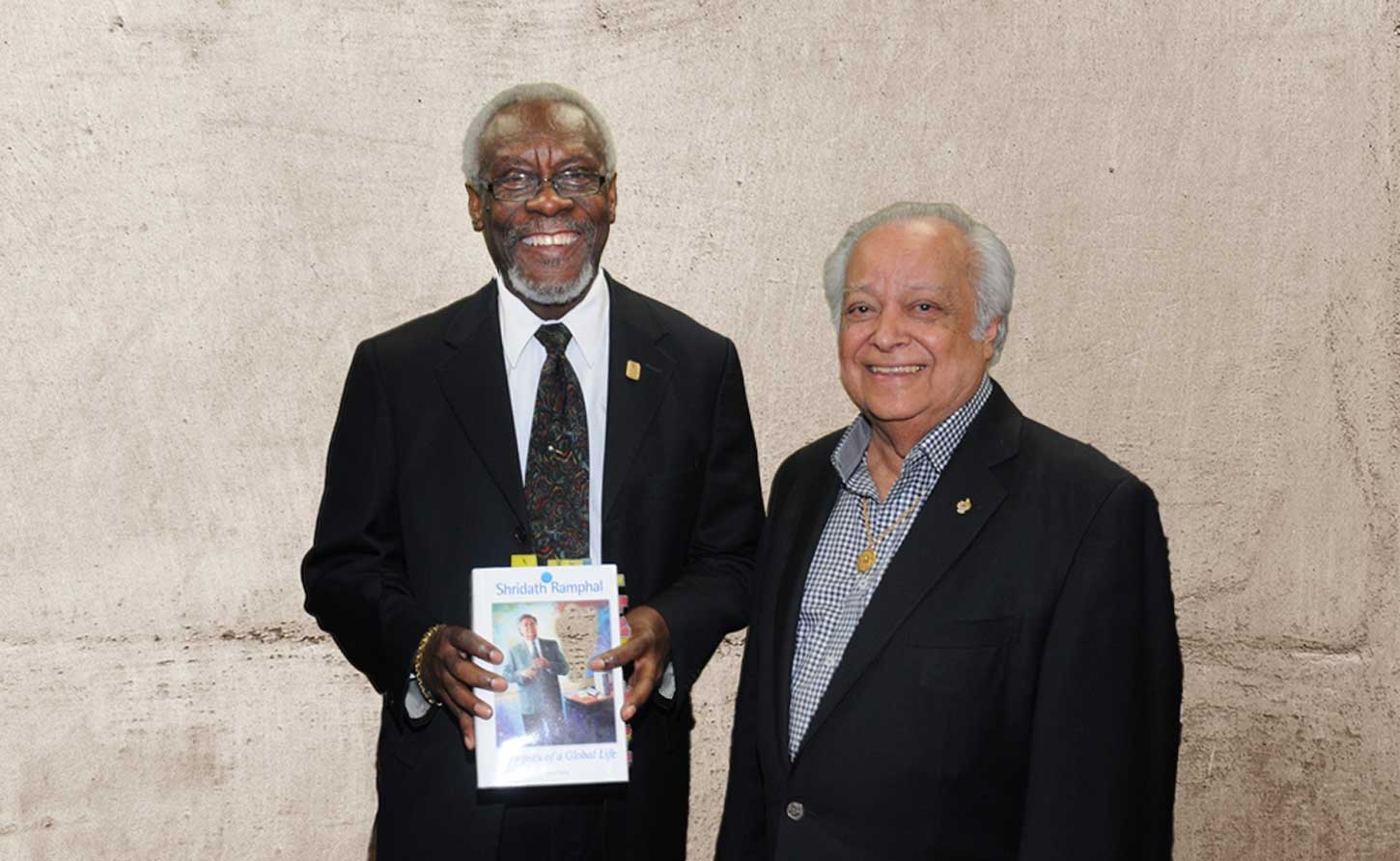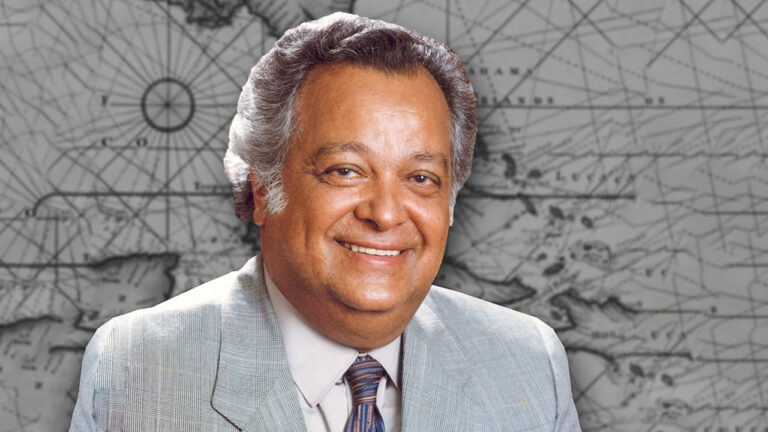JAMAICA | PJ Patterson honours Sir Shridath Ramphal as a Genial Giant of the Caribbean

Kingston, Jamaica, September 15, 2024 - In the annals of Caribbean history, certain tributes demand to be presented in their full, unabridged glory. Only through a complete rendering can readers truly grasp their profound significance.
Such is the case with the powerful eulogy delivered for Sir Shridath Ramphal at his funeral service in Guyana. The orator? None other than the esteemed Caribbean statesman and former Prime Minister of Jamaica, The Most Honorable P.J. Patterson. His words stand as a testament to Sir Ramphal's monumental legacy and deserve to be experienced in their entirety.
TRIBUTE TO SIR SHRIDATH RAMPHAL BY PERCIVAL J. PATTERSON, OCC

Shridath Surendranath Ramphal never sought and therefore never held any electoral office. When I served as the courier of his acceptance to become Attorney-General, he stipulated in the letter which I took to Georgetown in January 1965, that his role would be “a bureaucrat without political affiliation.”
Throughout his entire life, he remained above the partisan divisive fray.
His strident insistence “on being Guyanese before being Indian and being West Indian before being Guyanese” is sufficient to make him truly unique as a Caribbean paragon.
A legal scholar of exceptional brilliance, he embarked on a journey of unswerving regional commitment when he transited from the post of Solicitor General in British Guyana to become Assistant Attorney General of the Federal Government, despite the absence of that territory from the West Indian Federation.
“I have been a West Indian from the first moment of awareness of such things and wherever I have lived in the region from Guyana to Trinidad, to Jamaica to Barbados,” Sonny Ramphal repeatedly asserted.
No one -but no one- has spoken more passionately and more persistently written or more assiduously toiled in the vineyard of oneness than this genial giant.
After the Federal collapse, Ramphal had settled into lucrative practice at the Jamaican Bar, winning both professional renown and financial rewards when the summons from his native land arrived. He took a hard but life-changing decision.
Ramphal always exhorted fellow Counsel to perceive the law “as a tool of social engineering.” It would not be long before his tremendous grasp of the intrinsic value of foreign policy in a complex and divided world resulted in catapulting him to serve as the first Foreign Minister of an Independent Guyana.
With our Caribbean space as his vineyard, the world was now the cathedral in which he would reveal his mantra as an insightful jurist to champion the universal call for “Justice to prevail and inequity to be vanquished.”
The seed to build regionalism after the ruined experiment was planted at Dickenson Bay in December 1965. Ramphal was hand-picked to do the leg work that would bring CARIFTA into force. Once the scope of his remit was extended beyond legislative drafting and constitutional reform, Ramphal was free at long last to be fully engaged in the momentum of regional economic integration.
By the time we met at Chaguaramas in 1972 and broke the pernicious embargo against Cuba, Leaders of both sovereign and non-independent countries alike were prepared to empower the existing regional institutions and move to the establishment of a Caribbean Community so as to “enhance the process of integration and occupy our rightful place not as hapless takers of history’s ordained lot; but as makers of our own way in a less than benign world,” as Ramphal wrote.
Looming on the horizon were the pending negotiations with the European Community for a new post-colonial trade and economic regime. The Caribbean quickly recognised that there were primary commodities and minerals in which we had a common and compelling interest that were best promoted not simply by unity among ourselves, but in combination with the nations of Africa and The Pacific to form one solid, impenetrable phalanx.
No superlative is excessive to applaud the master stroke of Shridath Ramphal when he boldly convened and astutely chaired that Ministerial meeting which eventually led to the Georgetown framework to consolidate the ACP Group as a formidable force. The intense and assiduous negotiations for the Lomé Convention resulted in “a package of comprehensive economic arrangements that constituted the first model for a fair and mutually beneficial partnership between the developed and developing world,” which we have yet to replicate or extend.
At the United Nations, the Non-Aligned, in hemispheric gatherings alike, Ramphal commanded total respect and ensured that despite our size, the Caribbean always stood tall and resolute in pursuit of a binding and equitable international system.
It was therefore no surprise when in 1975, Shridath Ramphal was chosen by unanimous acclamation to become the second Secretary-General of the Commonwealth. He took the helm at a time when the mounting tensions in Southern Africa and the economic disparity between developed and developing member nations put into question the survival and future prospects of the Commonwealth itself.
In responding to the challenges of transformation from Empire to an aggregation of sovereign nations that are multi-ethnic, multi-lingual and encompassing every religious creed; of small island states and landlocked countries alike, it is incontrovertible for us to proclaim today: “There is no one who has made a more enduring contribution to the evolution and catalytic force of the modern Commonwealth than this Avatar - Shridath Ramphal- the quintessential diplomat and consummate statesman.”
Under his adroit and tenacious guidance, the Commonwealth Secretariat became the hub for strategic expert studies and programmes of technical assistance that spanned the entire gamut of major global issues and regional priorities.
It encompassed the imperatives of a new and fair economic order; monetary policies, the debt burden; market access and commodity arrangements. He ensured that Commonwealth Ministerial meetings, whether pertaining to finance, trade, education, health, labour or law serve as the theatre to find common ground for one-third of the world’s people and thereby become a compelling voice at every global table.
He was a beacon of hope for the developing world and a bastion for peace and justice.
But no matter how significant was the influence of the Commonwealth in these spheres, it was in the fight against the evils of racism, the scourge of imperial exploitation and the quest for justice, freedom and human liberty everywhere that this exemplary descendant of indentured labour from the Caribbean made the most decisive difference and attained the zenith of his illustrious career.
His obdurate insistence, applied with unswerving diplomatic ingenuity, that the Commonwealth he anchored should be in the vanguard to liberate Zimbabwe, eradicate Apartheid in South Africa and de-colonize Namibia, gradually but finally overwhelmed the obduracy of those who sought to entrench racism and abominable domination for the benefit of their Kith and Kin.
His triumphs as a grandmaster of diplomacy and global statesmanship were to result in being denied the ultimate office for which he was eminently qualified- Secretary-General of the United Nations. His candidature may not have been vetoed by that country whose then Foreign Minister pledged “to swim the Atlantic twice.”
Speculation is rife that it may have been exercised by any Permanent Member of the Security Council who feared that “Ramphal would be tempted to do something with the UN – to run it efficiently; and bring back some of its old sense of purpose and idealism,” as he had done in London for “a community of Nations.”
Ramphal to the very end accepted that possibility with pride and equanimity for he had remained true and steadfast in the struggle of the developing world.
The Ramphal report – Time for Action – is much more than the only blueprint “to overcome the historical forces and the Caribbean Sea which have divided us.” It is and will always be forever a clarion call “to build on the oneness of our foundations; not in the geography of a divided sea.” It is a holistic testament that places him in the pantheon of Caribbean immortals.
When confronted with the need to negotiate simultaneously with NAFTA, The European Union and the WTO the urgency of the Caribbean Community to bolster the negotiating capacity became immediately evident. Sonny Ramphal along with Alister McIntyre were at the ready to respond once again to the call for their expertise and acumen through the Regional Negotiating Machinery of which I Chaired.
His formidable intellect, analytical genius and pedagogic acuity resulted in his preferment to become Chancellor of 3 prestigious universities simultaneously, Warwick, Guyana and UWI.
The visionary global icon Ramphal with an exceptional range of experience and depth of knowledge is the only person who was called upon to serve three (3) distinguished International Commissions which between them encompassed poverty, the environment, development, disarmament, and global governance.
I could not possibly end without revealing the sense of solitude I feel at the departure of a dear friend, precious colleague, and inveterate warrior.
My only source of comfort and consolation springs from the acceptance that while his earthly sojourn has ended, Shridath “Sonny” Ramphal leaves behind a rich legacy; a sound foundation on which to build. He bequeaths a scoreboard of outstanding accomplishments which will forever remain beacons to inspire all who seek to follow in his footsteps.
His eternal testament for generations yet to come is a treasure trove of essays, literary work and publications which must serve as an eternal testament that will forever illumine our path in the quest to fulfill “the identity of oneness, to build our own future and chart our own destiny as cornerstones of the emerging Caribbean civilisation.”

 Ar
Ar  En
En